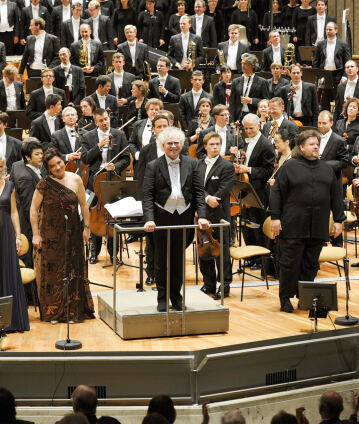Interview
Sir Simon Rattle on Mahlers Symphony No. 8 Simon Rattle dirige la « Symphonie des Mille » de Mahler

Les choristes ont dû se glisser entre les rangs des spectateurs pour ce concert chaleureusement acclamé où Simon Rattle dirige la monumentale Symphonie des Mille de Gustav Mahler. La création de l’œuvre en 1910 – avec Siegfried Wagner, Richard Strauss, Arnold Schönberg, Bruno Walter, Stefan Zweig et Thomas Mann dans le public – avait déjà valu à Mahler le plus triomphal succès de sa carrière. Il considérait d’ailleurs cette symphonie comme « la plus grande chose que j’aie faite jusqu’à présent ».
Berliner Philharmoniker
Sir Simon Rattle
Chœur de la Radio de Berlin
Maîtrise d’État de la cathédrale de Berlin
© 2011 Berlin Phil Media GmbH
Interviews liées au concert
Artistes
Nos suggestions
- La « Passion selon saint Matthieu » de Bach avec Simon Rattle et Peter Sellars
- Jakub Hrůša dirige le Stabat Mater de Dvořák
- Adam Fischer dirige Mozart et Haydn
- Murray Perahia et Simon Rattle dans le Concerto pour piano de Schumann
- Kirill Petrenko dirige la Neuvième de Beethoven à la Porte de Brandebourg
- Daniel Barenboim dirige le Requiem de Verdi